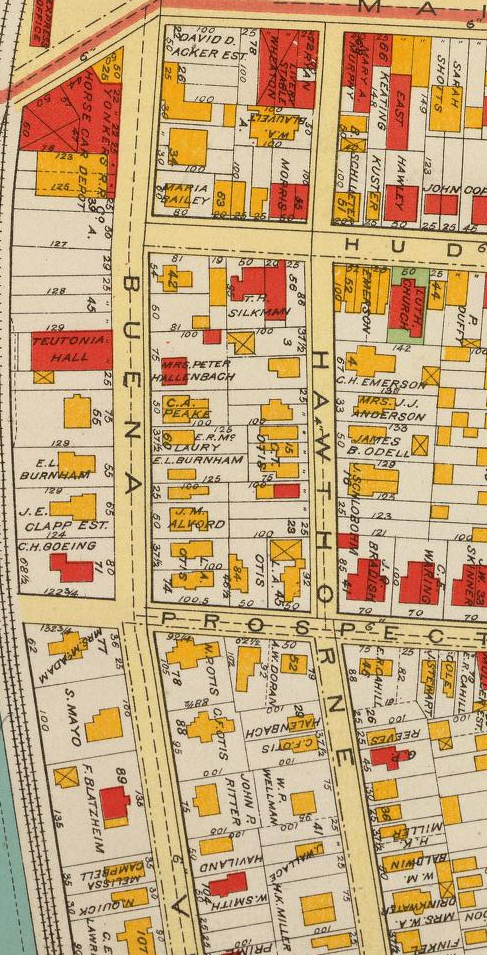The following excerpt is from a speech by New York City Mayor McClellan in 1909.
Yonkers Teutonia Hall
Early in the 20th Century, Yonkers was home to many ethnicly based social clubs and organizations. Mirroring the
US at that time, newly immigrated groups would settle in geographic proximity to each other to build a new life in America.
Establishing Social Clubs, Brotherhoods and Houses of Worship were one way they could help each other and build the community.
The goal was to assimilate into US society. One such group were the Germans who established a "singing and literary society"
in Yonkers in 1856 and built their own building on Buena Vista Avenue in 1891-92 and also a church on Hudson Street. Read
about their organization and see photos of Teutonia Hall below. Further down read excerpts from newpaper articles about significant
events held at the Hall.
Today, the building has been unoccupied for many
years and was recently sold to a developer. Its fate is uncertain, but clearly the building and the organization it housed,
played an important cultural and educational role in the city of Yonkers and in lives of many of the city's German ancestors.
The society searched for land to build their own hall. The site purchased was on Buena Vista avenue. See
the 1881 map below and note the land belonging to the Mutual Life Insurance Company.
Below is a map from 1893 which shows the location of Teutonia Hall a year after it was built. Note the homeowners
adjacent and across from the bulding included the Otis Family and J. M. Alvord. Alvord was a partner in the Otis Company for
a brief period.

Organizational description of Yonkers Teutonia published in 1901.
Note some influential citizens of the past were its Presidents (e.g. Rudolf Eickemeyer* and John Schlobohm)
*Read about the life of Rudolf Eickemeyer (Sr.). Click below to read his Euology dlivered by Frederic Shonnard in
1895.
Click here
If Walls Could Talk
Whenever one enters a building with a long history, particularly a building that performed a social and
educational function in the development of a city, one can only imagine the people who passed through its doors. Thousands
of events and functions that took place within its walls and the history and the changes that were taking place beyond its
walls worked together to shape and develop a city and nation. In thinking about what should and should not constitute a landmark,
that is a site that should be preserved, one must consider its historic value. This value is not necessarily just architectural
in nature, or location based, but consideration should be given to its social and historic position as well. Is it just an
old building or is it something more. Does the site offer learning to future generations as well as the present generation.
If walls could talk what would they say? The following are some news articles from the New York Times describing events held
at Teutonia Hall from its earliest beginnings in 1892. Some were of importance to the German members, some were important
to all citizens of Yonkers and the greater geographic area.
The following excerpt is from the New York Times 1894:
The following excerpt is from the New York Times 1896:
What
do you think? Your comments are important. Please share your thoughts. Thank you!

